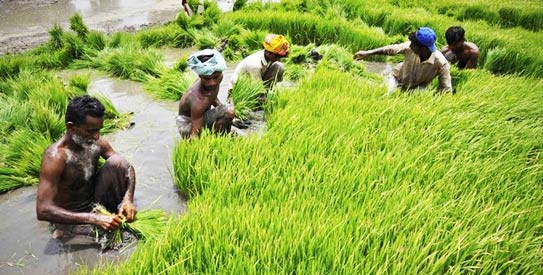Research on new rice
variety
By
Zuhair Hasnain
 Feeding
Asia in the 21st century will require a second Green
Revolution. However, unlike in the first generation,
future yield increases will have to come from crop
varieties using less water and nitrogen in view of
global climate change. Feeding
Asia in the 21st century will require a second Green
Revolution. However, unlike in the first generation,
future yield increases will have to come from crop
varieties using less water and nitrogen in view of
global climate change.
This can only be done by increasing the efficiency of
photosynthetic system, i.e. developing a C4 rice plant.
If and when achieved, it would be the first
non-evolutionary example of reconstructing the primary
metabolism of a plant. The impact of such a scientific
achievement would be undeniable, but it requires either
a superb feat of genetic engineering or forced
evolution.
The world population today is about seven billion, and
almost half of it depends on rice. The alarming thing is
that a billion people live on less than a dollar a day
and spend half of their income on food, 854 million
people are hungry and each day about 25,000 people die
from hunger-related causes.
At present when elite rice cultivars, which dominate the
food supplies of millions of poor people in Asia, have
approached a yield barrier, plant breeding seems to have
exploited all of the intrinsic high yield-linked genes.
Insufficient yield of rice produces food insecurity and
social unrest. The C4 Rice raises hope that threats to
food security will be tackled.
IThe C4 is a cutting edge science. Different consortia
in more than ten countries are working in this context
to change C3 plants to C4 with the basic strategy,
underlining idea is to discover the genes, generate a
model plant and then introduce C4 photosynthesis into
widely used cultivars. An approximate guess is that 50
per cent yield will be increased after introducing
C4ness in rice.
Pakistan is the sixth most populous country and its
graph of poverty is rising due to rocketing food prices.
Being agro-based, bulk of the country’s population is
linked directly or indirectly with agriculture. It has
all the favourable conditions of soils, irrigation water
and climate but it is a net importer of food grains.
Growing rice countrywide, Pakistan has added advantage
of world renowned Kallar Tract (a bowl-shaped region)
that has further premium over Basmati from other
regions. In this scenario, when the average rice yield
in most countries is more than ten tons/hectare, it is
still stuck up on 2-3 tons/hectare (Economic Survey of
Pakistan, 2011). The gap between actual and potential
yield has to be bridged.
There is a long list of factors for this low
productivity, but the focus here is on the research
wing. The country will have to change its research
patterns. It has to catch up with the new horizons and
methodologies of research going worldwide. I would like
to correlate the rice research in Pakistan with C4 rice
research that is an emerging integrated type of research
funded by Bill & Mellinda Gates foundation,
simultaneously going in different parts of world and
headed by one centre.
Pakistan, having the best Basmati rice should be a part
of this global research, sharing the latest views and
writings, huge funding from the project, active
utilisation of scientific potential, technical staff
opportunities etc. If the world will succeeds in
creating a C4 rice strain, Pakistan will be benefit
accordingly.
The writer is PhD research scholar at International Rice
Research Institute, Los
Courtesy: The DAWN
|